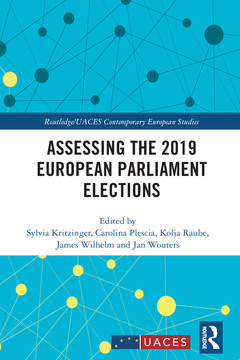Assessing the 2019 European Parliament Elections Routledge/UACES Contemporary European Studies Series
Coordonnateurs : Kritzinger Sylvia, Plescia Carolina, Raube Kolja, Wilhelm James, Wouters Jan

Informed by and against the backdrop of the 2019 European Parliament (EP) elections, this innovative book provides a critical assessment of where Europe stands in terms of the quest to achieve democratic legitimacy. Since the 2014 EP elections, the European Union (EU) has experienced multiple crises, which arguably have undermined its legitimacy.
The 2019 EP elections were hence seen as a crucial moment in the EU?s attempts to show resilience and regain trust. Using political science and legal frames of analysis, Assessing the 2019 European Parliament Elections provides an understanding and assessment of the current politico-legal framework, and its impact on European elections. Furthermore, using original data, it provides a timely examination of public opinion issue priorities and voting behaviour at the 2019 EP elections in eight countries. Given the critical conjuncture that the 2019 EP elections represent, this volume provides a key contribution to understanding both the dynamics surrounding the elections, as well as voters? responses, and informs debates on European politics, for example, second-order elections, democratic legitimacy and political representation.
This book will be of key interest to scholars and students of EU politics, public administration, European studies, European law, and sociology, along with practitioners in politics, journalism, and policy analysis.
Introduction: Assessing the 2019 European Parliament Elections Part I: The Politico-Legal Framework of the 2019 European Elections 1. The Long and Winding Road towards a European Electoral Law 2. From Dawn to Doom: The institutionalization of the Spitzenkandidaten-process during European elections and its final negation 3. The Fall of the Spitzenkandidaten: Political parties and conflict in the 2019 European elections 4. Party-groups and Ideological Cleavages in the European Parliament after the 2019 Elections Part II: Public Opinion and Voting Behaviour at the 2019 European Parliament Elections 5. European Parliament Elections as Second Order National Elections 6. First-Order Breakthrough or Still Second Order? An assessment of the 2019 EP elections Part III: The 2019 European Parliament Elections in Eight Countries 7. The 2019 EP Election in Austria: A highly salient domestic test election 8. The 2019 EP Election in Denmark: A European election within a national contest 9. Second-Order or Second Hand? The 2019 EP election in France 10. Between Migration and the Climate Crisis: The 2019 EP election in Germany 11. Orbán’s Long Shadow: The 2019 European Parliament election in Hungary 12. 2019 European Election in Italy: Second-order but still salient elections? 13. The 2019 EP Election in Poland: In the shadow of extreme polarization 14. The 2019 EP Election in Spain: Settling a national score? From Second-Order towards First-Order Elections: Some Concluding Observations
Sylvia Kritzinger is Professor of Social Science Research Methods in the Department of Government at the University of Vienna, Austria.
Carolina Plescia is Assistant Professor and Hertha Firnberg scholar in the Department of Government at the University of Vienna, Austria.
Kolja Raube is Assistant Professor for European Studies in the Faculty of Social Sciences at KU Leuven, and Research Manager at the Leuven Centre for Global Governance Studies, Belgium.
James Wilhelm is a Postdoctoral Researcher at the Vienna Center for Electoral Research at the University of Vienna, Austria.
Jan Wouters is Full Professor of International Law and International Organizations, Jean Monnet Chair ad personam European Union and Global Governance, and Director of the Leuven Centre for Global Governance Studies at KU Leuven, Belgium.
Date de parution : 12-2021
15.6x23.4 cm
Date de parution : 04-2020
15.6x23.4 cm
Thème d’Assessing the 2019 European Parliament Elections :
Mots-clés :
European Parliament Election; EP Election; EU Membership; EU Issue; Ursula Von Der Leyen; EP Party Group; EP Election Campaign; Von Der Leyen; Country’s EU Membership; National Electoral Cycle; EP; Vote Choice; Make Up; EU Position; AUNTES; Danish People’s Party; Previous EP Election; Reported Vote Choices; Biggest Party Group; EU Politics; European Integration Dimension; En Marche; Direct Democracy; Previous National Election; ALDE



